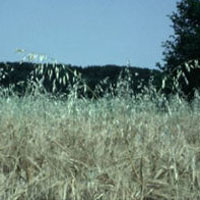Oats
 © Steven Foster
© Steven FosterHow It Works
The fruits (seeds) contain alkaloids, such as gramine and avenine, and saponins, such as avenacosides A and B.2 The seeds are also rich in iron, manganese, and zinc. The straw is high in silica. Oat alkaloids are believed to account for the relaxing action of oats, but it should be noted this continues to be debated in Europe. The German Commission E does not approve this herb as a sedative.3 However, an alcohol-based tincture of the fresh plant has reportedly shown some promise in countering nicotine withdrawal and helping with smoking cessation.4
How to Use It
A tea can be made from a heaping tablespoonful (approximately 15 grams) of oats brewed with 1 cup (250 ml) of boiling water. After cooling and straining, the tea can be taken a few times a day and shortly before going to bed.5 As a tincture, oats are often taken at 1/2–1 teaspoon (3–5 ml) three times per day. Capsules or tablets, 1–4 grams per day, can be taken. A soothing bath to ease irritated skin can be made by running the bath water through a sock containing a few tablespoons of oats, then bathing in the water for a few minutes.
Copyright © 2024 TraceGains, Inc. All rights reserved.
Learn more about TraceGains, the company.
The information presented by TraceGains is for informational purposes only. It is based on scientific studies (human, animal, or in vitro), clinical experience, or traditional usage as cited in each article. The results reported may not necessarily occur in all individuals. Self-treatment is not recommended for life-threatening conditions that require medical treatment under a doctor's care. For many of the conditions discussed, treatment with prescription or over the counter medication is also available. Consult your doctor, practitioner, and/or pharmacist for any health problem and before using any supplements or before making any changes in prescribed medications. Information expires December 2024.



 We are proud to announce that
We are proud to announce that  As the market evolves, customers increasingly request a wider variety of omega-3 options for their lipid...
As the market evolves, customers increasingly request a wider variety of omega-3 options for their lipid...  Maintaining healthy glucose levels is crucial for preventing metabolic conditions like diabetes,...
Maintaining healthy glucose levels is crucial for preventing metabolic conditions like diabetes,...  Looking at formulating a new vitamin blend? Discover
Looking at formulating a new vitamin blend? Discover 







































